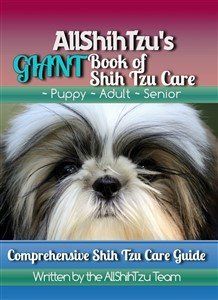Shih Tzu Diarrhea
Overview
Diarrhea in Shih Tzu dogs is a common concern for many pet parents. This condition not only causes discomfort for the dog but can also lead to more serious health issues if not addressed promptly and effectively. Understanding the nature of diarrhea, its causes, symptoms, and treatments is vital for Shih Tzu owners to ensure the health and well-being of their furry companions.
Please note: AllShihTzu is reader-supported, and some of the product suggestions on this page are affiliate links. As an Amazon Associate we earn from qualifying purchases. This is at no extra cost to you and helps keep this site running.
The Definition of Canine Diarrhea
Diarrhea in dogs is characterized by the frequent passage of loose, unformed, or liquid stools. It differs from normal bowel movements, which are typically solid and well-formed. Diarrhea indicates a disruption in the normal absorption of water and nutrients in the dog's gastrointestinal tract.
Signs and Symptoms
The primary symptom of diarrhea in Shih Tzu dogs is the change in the consistency and frequency of bowel movements. Stools may be soft, watery, or entirely liquid. Other signs include an increased volume of stool, urgency in defecation, and, in some cases, an increase in the frequency of bowel movements. Dogs may also exhibit signs of abdominal pain, lethargy, loss of appetite, and dehydration.
The Causes of Diarrhea with Shih Tzu Dogs
1. Dietary Indiscretion: Shih Tzu dogs may consume inappropriate items due to their curiosity, leading to digestive issues. Ingesting garbage, spoiled food, or toxic substances like chocolate, grapes, or xylitol can disrupt their sensitive digestive systems.
Sudden dietary changes or eating rich, fatty foods can also cause an
upset stomach. Such dietary indiscretions can upset the gut's bacterial balance, causing diarrhea, and
in severe cases, lead to pancreatitis, where the pancreas becomes inflamed, impairing digestion.
2. Food Intolerance and Allergies: Shih Tzu dogs may develop intolerances or allergies to certain foods, which can manifest as gastrointestinal symptoms including diarrhea, vomiting, and gas. Food intolerances typically involve an adverse reaction to a component in the food, such as lactose in dairy products.
In contrast, food allergies involve the immune system reacting to a specific protein found in the food. Common allergens for dogs include beef, dairy, wheat, egg, chicken, lamb, soy, pork, rabbit, and fish. Food allergies can also lead to
skin irritations and itching, exacerbating the discomfort for the dog.
3. Infections: Diarrhea in Shih Tzus can be caused by a range of infections:
- Bacterial Infections: Salmonella and E. coli are common bacterial infections that can be contracted from contaminated food or water. These bacteria can cause severe gastrointestinal upset, including diarrhea, vomiting, and abdominal pain.
- Viral Infections: Viruses like Parvovirus are highly contagious, especially in puppies, and can cause severe diarrhea, vomiting, lethargy, and loss of appetite. Parvovirus is a life-threatening condition that requires immediate veterinary care.
- Parasitic Infections: Intestinal parasites such as Giardia, roundworms, hookworms, whipworms, and tapeworms are common in dogs. These parasites can cause diarrhea, weight loss, and an overall poor condition. They are typically contracted through contaminated soil, feces, or water.
4. Stress: Emotional stress, such as changes in environment, separation from owners, or the introduction of new pets, can affect a Shih Tzu's digestive system. Stress can disrupt the normal functioning of the gastrointestinal tract, leading to symptoms like diarrhea. This type of diarrhea is often sudden in onset and can be accompanied by other signs of stress or anxiety, such as pacing, whining, or excessive licking.
5. Underlying Health Conditions: Chronic diseases can manifest as diarrhea in Shih Tzus, including:
- Inflammatory Bowel Disease (IBD): A condition characterized by chronic inflammation of the intestines, leading to symptoms like diarrhea, weight loss, and abdominal discomfort.
- Pancreatitis: Inflammation of the pancreas that disrupts digestive enzyme production, leading to diarrhea, vomiting, and abdominal pain.
- Liver Disease: Liver dysfunctions can lead to poor digestion and absorption of nutrients, resulting in diarrhea and other symptoms like jaundice and lethargy.
6. Medications: Certain medications prescribed for unrelated health issues can have side effects that include diarrhea. Antibiotics, for example, can disrupt the natural balance of gut bacteria, leading to diarrhea. Other medications, such as nonsteroidal anti-inflammatory drugs (NSAIDs), can also cause gastrointestinal upset. It's important to monitor your Shih Tzu's reaction to new medications and consult with your veterinarian if diarrhea or other adverse reactions occur.
At-Home Remedies
Managing mild cases of diarrhea in dogs at home involves several crucial steps that can help alleviate symptoms and promote recovery. It's important to remember that if symptoms persist or worsen, consulting a veterinarian is essential. Below are detailed approaches for each remedy:
1. Dietary Management: Start a brief fasting period of 12 to 24 hours which can help your Shih Tzu's digestive system rest and recover. This means withholding all food, but not water. Fasting helps to clear out the stomach and intestines, reducing irritation and inflammation. After those 12 to 24 hours, introduce bland, easily digestible food.
Boiled chicken breast (without skin and bones) and plain white rice are typically recommended. These foods are gentle on the stomach and can help to firm up stools. Gradually reintroduce your Shih Tzu's regular diet over a few days once their stools return to normal. Mix their regular food with the bland diet in increasing amounts to avoid upsetting their stomach again.
2. Hydration: Continuous access to fresh water is crucial. Diarrhea can lead to dehydration quickly, so ensuring your little guy or gal stays hydrated is vital. Change the water frequently to encourage drinking. Keep an eye out for signs of dehydration, such as lethargy, dry gums, and decreased skin elasticity. If you notice these symptoms, contact your vet immediately.
3. Electrolyte Solutions:
In some cases, an unflavored electrolyte solution may be beneficial to help maintain proper hydration and electrolyte levels. Consult with your vet first; offering a 50/50 mix of water and children's Pedialyte is often recommended.
4. Probiotics. Probiotics are beneficial in restoring the natural balance of gut bacteria, which can be disrupted during episodes of diarrhea.Opt for probiotics specifically formulated for dogs, as their gut flora is different from humans. One that we recommend is Zesty Paw’s Probiotics. Even after symptoms improve, continuing probiotics can support digestive health and prevent future episodes.
5. Over-the-Counter Medications: Before administering any over-the-counter medications like Pepto Bismol, consult with your veterinarian. They can advise on the correct dosage and whether it's suitable for your dog’s specific condition.
If given the green light, follow the vet’s instructions carefully regarding dosage and frequency. Over-medicating can lead to further complications. Keep an eye on your Shih Tzu's reaction to the medication. If you observe any adverse effects, such as increased vomiting or changes in behavior, stop the medication and consult your vet immediately.
In all cases, these remedies should be used with caution and under the guidance of a veterinarian, especially if a Shih Tzu has underlying health conditions or if the diarrhea is severe or persistent.
Veterinary Treatment
When dealing with severe or persistent diarrhea in Shih Tzu dogs, professional veterinary intervention is crucial. The treatments administered by a vet can vary based on the severity and underlying cause of the diarrhea. Here's an expanded overview of common veterinary treatments:
1. Fluid Therapy: In severe cases of diarrhea and serious dehydration, fluid therapy is vital. This often involves intravenous (IV) fluids to quickly replenish lost fluids and electrolytes. The vet will monitor hydration status closely and adjust the fluid therapy as needed to ensure proper recovery.
2. Prescription Medications: For diarrhea caused by bacterial infections, antibiotics are prescribed to eliminate the infection. The choice of antibiotic will depend on the type of bacteria suspected or identified. Depending on the diagnosis, other medications like anti-parasitics, anti-inflammatories, or motility-regulating drugs may be prescribed to address the specific cause of the diarrhea.
3. Dietary Changes: With chronic conditions like inflammatory bowel disease or intolerance to certain foods, a dog's diet may need to be changed. This will vary depending on the exact diagnosis.
4. Further Testing: In cases where the cause of diarrhea isn't clear, the vet may recommend diagnostic tests such as blood tests, fecal examinations, or imaging studies like x-rays or ultrasounds. These tests help in identifying underlying issues like organ dysfunction, infections, or obstructions. Based on the results of these tests, the vet can develop a more targeted treatment plan, addressing the specific underlying causes of the diarrhea.
In all cases, the veterinarian's guidance and treatment plan should be followed closely to ensure the best possible outcome for a Shih Tzu. Regular follow-up appointments may be necessary to monitor recovery and make any necessary adjustments to the treatment plan.
Join the AllShihTzu family:
Related Articles:
Top Treats for Shih Tzus with Sensitive Stomachs – If your Shih Tzu has a tummy that’s quick to protest, finding the right treat can feel like a guessing game. Thankfully, there are gentle options that dogs find super-delicious. See our list of the best belly-friendly treats.
More Helpful Articles:

